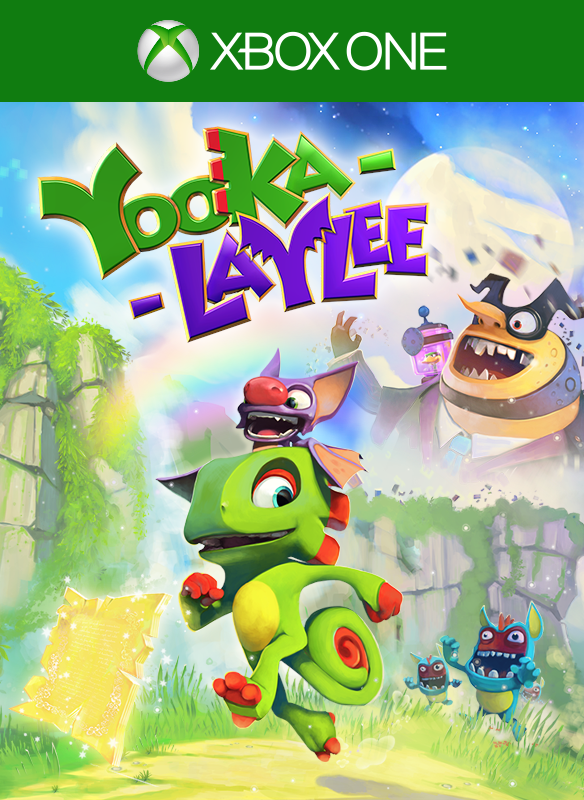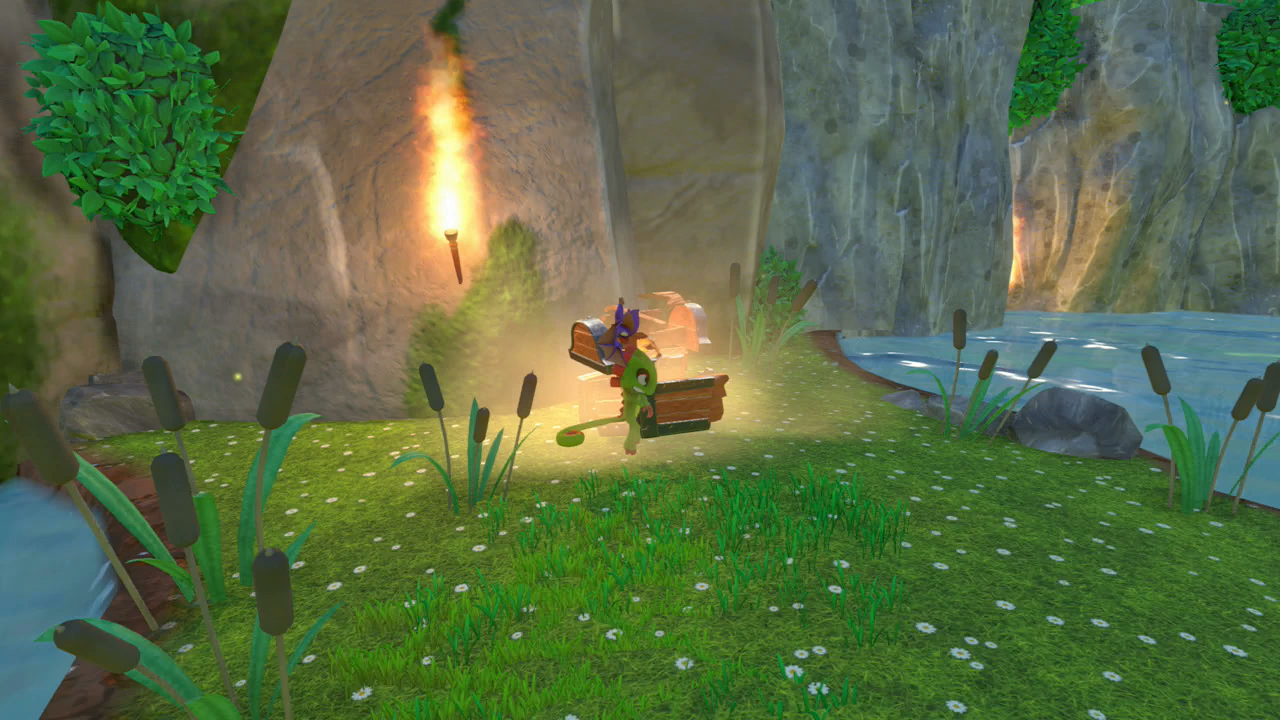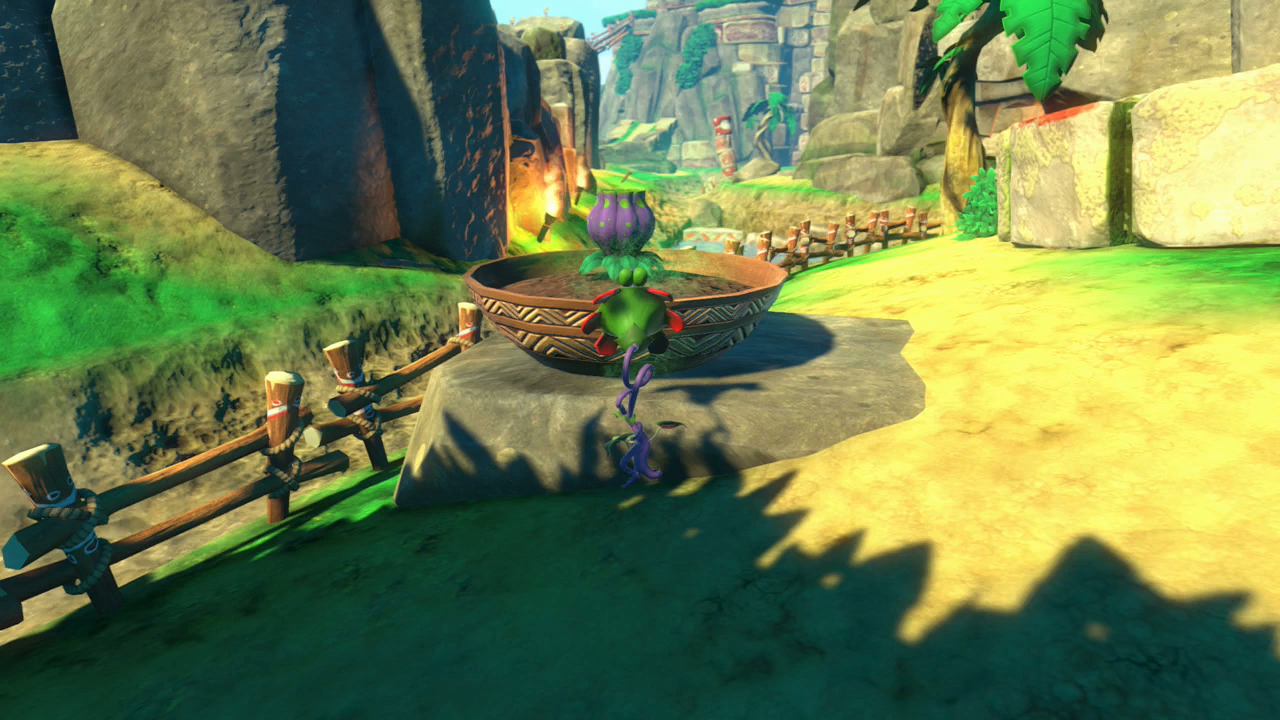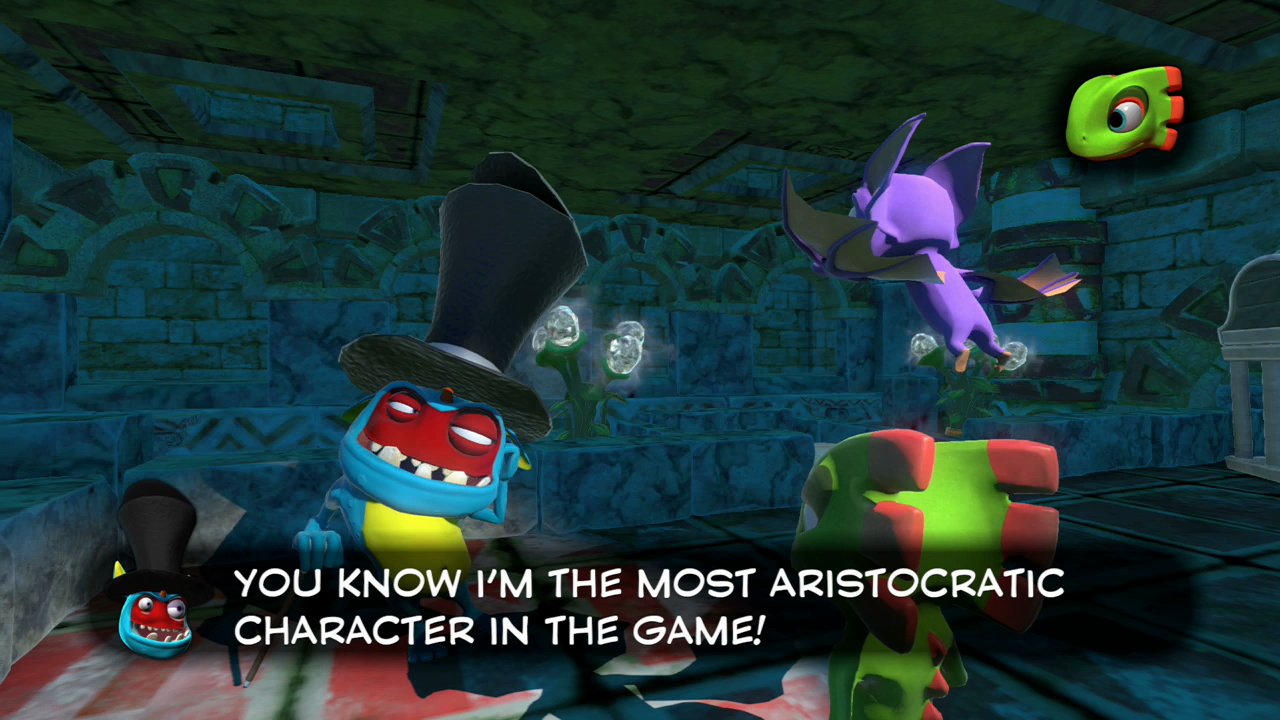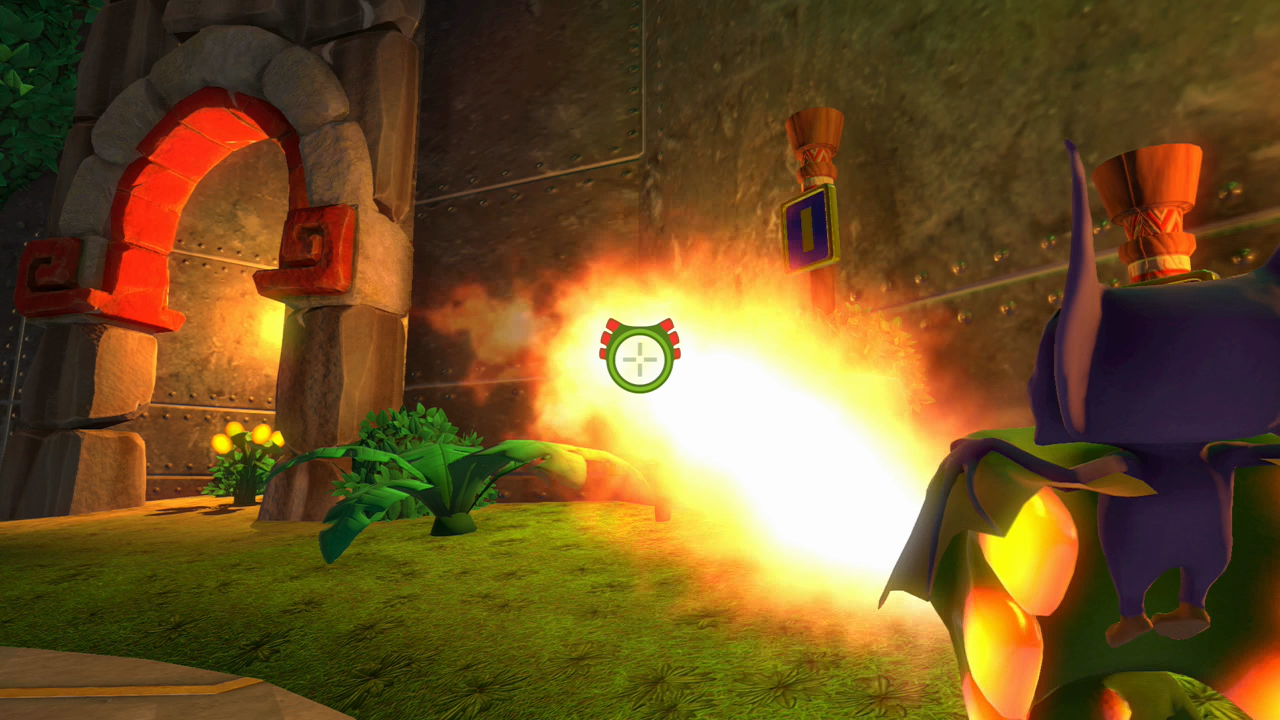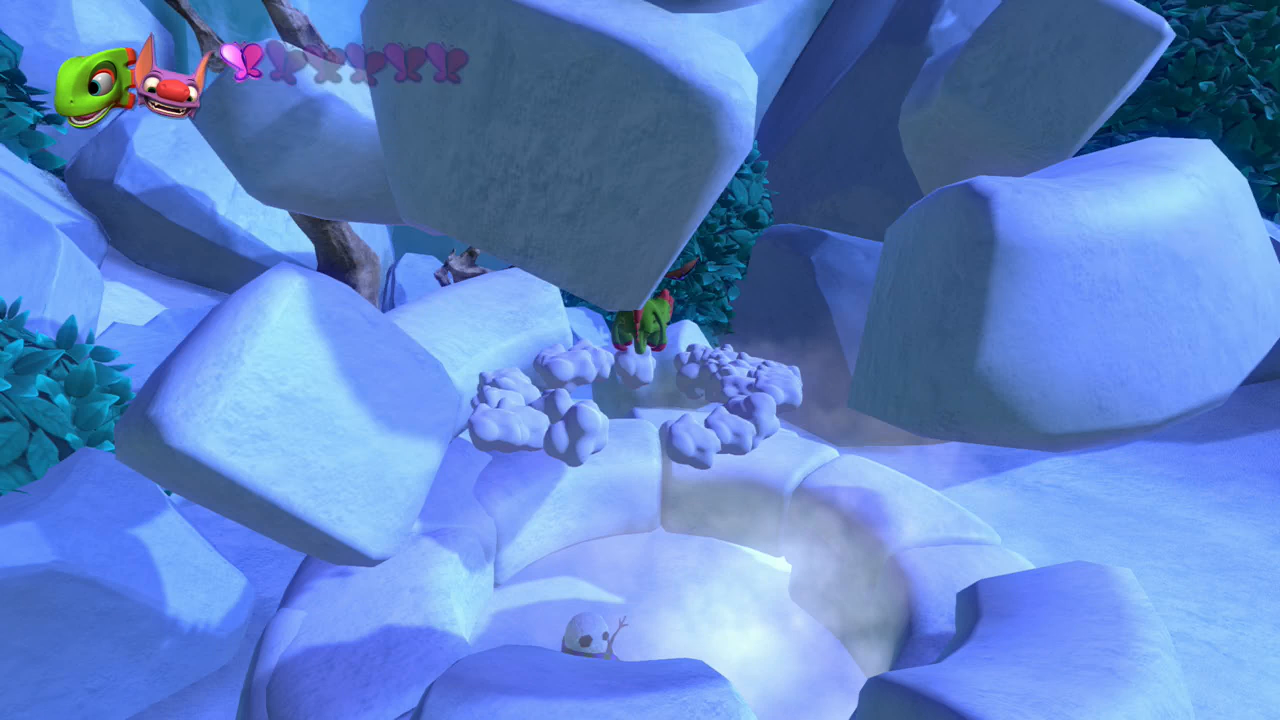YOOKA-LAYLEE (XONE)
With much of the original development team having departed and Rare focusing on Kinect sports for the rest of the Xbox 360’s lifespan, hopes of receiving a new Banjo game seemed bleak. Luckily, a handful of former Rare staffers would join together to form Playtonic Games and after a successful Kickstarter campaign, Yooka-Laylee would release in 2017. Essentially carrying the baton from the bird-and-bear duo who helped define Nintendo 64 platformers, this throwback feels like a time capsule. While a few ailments from the past haunt the game at points, those craving to relive the golden days of the 3D platformer should still enjoy it.
Capital B, CEO of the Hivory Towers, enacts a scheme to steal all the books in the world and control the market with assistance from Dr Quack. While Yooka and Laylee, a chameleon and bat duo, are enjoying sunbathing, their prized book is stolen, its pages split all across both the Towers and magical books containing Worlds. Now, with assistance from snake salesman Trowzer who gifts new abilities, the duo must regain Pagies from the book and put a stop to the nefarious scheme. Thus follows an adventure similar to Banjo: dialogue is all conversed in gibberish, there’s plenty of British humour and you must collect a ton of items while jumping between worlds. There are even transformations that see the duo transform into a helicopter, a plant and a fish.
Yooka-Laylee is a pretty platformer with many of its influences rooted in the late nineties
This ode to platformers-past goes deeper, however. Spread across five worlds, each contains 200 Quills and 25 Pagies. Each of the Pagies is locked behind challenges, ranging from platforming courses to mini-games. Minecart gem collecting, races and shooting challenges make up the bulk of gameplay. However, much of these are locked away initially, with Quills used as a currency to buy powers from Trowzer. These allow Yooka to divebomb, extend his tongue to pick up items and use Laylee’s sonic screech. Hivory Towers even offers Pagies to find, and these can be used to unlock worlds. Within each world, you can also find upgrades to improve health, power and tokens to interact with certain characters. Lastly, Tonics can be equipped which gift certain buffs such as stamina draining slower when you roll. It feels like a direct follow-up to platformers from the 64-bit era on a surface inspection.
There are some tweaks to the formula which prove welcome. The structure feels much less linear than previous games, with worlds not requiring every Pagie to progress. Instead, you can choose either to move to the next world or expand the current one, allowing you to scour for the remaining Pagies and challenge each world boss. Trowzer often offers multiple abilities at once, meaning you could explore each world in a relatively flexible order. It perhaps leads to some wandering, as the larger worlds can feel a touch barren at times. Quills feel quite spaced out, and not placed in a natural chain to steer your exploration. But it does offer more freedom to the player, and with Tonics carrying over between saves, return visits prove quite enticing. It helps that controlling Yooka feels great, with smooth movement and jumping making exploration a breeze compared to older games. With infinite lives, it’s also less frustrating and encourages riskier stunts to uncover hidden secrets.
There are some tweaks to the formula which prove welcome. The structure feels much less linear than previous games, with worlds not requiring every Pagie to progress. Instead, you can choose either to move to the next world or expand the current one, allowing you to scour for the remaining Pagies and challenge each world boss. Trowzer often offers multiple abilities at once, meaning you could explore each world in a relatively flexible order. It perhaps leads to some wandering, as the larger worlds can feel a touch barren at times. Quills feel quite spaced out, and not placed in a natural chain to steer your exploration. But it does offer more freedom to the player, and with Tonics carrying over between saves, return visits prove quite enticing. It helps that controlling Yooka feels great, with smooth movement and jumping making exploration a breeze compared to older games. With infinite lives, it’s also less frustrating and encourages riskier stunts to uncover hidden secrets.
There are some tweaks to the formula which prove welcome. The structure feels much less linear than previous games, with worlds not requiring every Pagie to progress. Instead, you can choose either to move to the next world or expand the current one, allowing you to scour for the remaining Pagies and challenge each world boss. Trowzer often offers multiple abilities at once, meaning you could explore each world in a relatively flexible order. It perhaps leads to some wandering, as the larger worlds can feel a touch barren at times. Quills feel quite spaced out, and not placed in a natural chain to steer your exploration. But it does offer more freedom to the player, and with Tonics carrying over between saves, return visits prove quite enticing. It helps that controlling Yooka feels great, with smooth movement and jumping making exploration a breeze compared to older games. With infinite lives, it’s also less frustrating and encourages riskier stunts to uncover hidden secrets.
Sadly, not everything feels perfectly refreshed. The camera system is particularly cumbersome, despite offering more control than the N64 classics. It sometimes feels too low, getting stuck on corners of the environment, and random swaps between more static angles to highlight bigger scale moments feel off-putting. Bosses also feel disappointing, borrowing from the three-hit formula and seeing you decipher an attack pattern, strike, then repeat. In a weird twist, however, bosses are technically optional as you don’t need to acquire every Pagie to unlock the final boss encounter. But for those striving for 100% completion, they are a necessary evil to conquer and prove the weakest part of the game. The camera also causes some frustrations, especially when the trek back to these fights can be quite lengthy.
Sadly, not everything feels perfectly refreshed. The camera system is particularly cumbersome, despite offering more control than the N64 classics. It sometimes feels too low, getting stuck on corners of the environment, and random swaps between more static angles to highlight bigger scale moments feel off-putting. Bosses also feel disappointing, borrowing from the three-hit formula and seeing you decipher an attack pattern, strike, then repeat. In a weird twist, however, bosses are technically optional as you don’t need to acquire every Pagie to unlock the final boss encounter. But for those striving for 100% completion, they are a necessary evil to conquer and prove the weakest part of the game. The camera also causes some frustrations, especially when the trek back to these fights can be quite lengthy.
For speedrunners, you can likely reach the endgame in around 10 hours. But to uncover all 1010 quills and 145 pagies, you’re likely looking at closer to thirty hours. On top of the main story, you’ll encounter Rextro’s Arcade machines throughout each world. You can enjoy these minigames outside of the story, with some even offer four-player support for social gamers. They’re mostly inoffensive copies of classic titles like Joust and RC Pro-Am, but the multiplayer additions prove a welcome surprise.
Yooka-Laylee certainly looks the part, updating these platformers with a new coat of paint. The lighting is stunning, particularly in Tribalstack Tropics, which creates gorgeous shadows and sun-kissed views. Worlds, despite feeling a touch barren at points, are huge and suffer from no draw-distance limitations, which is handy for finding odd collectibles. Animations look great, particularly the terrified screech most grunts make when they spot you. Cut-scenes don’t look quite as nicely animated, but there are very few in the game. Performance can also sputter in some spots, but it’s never too bad. The sound proves divisive, with the gibberish dialogue getting so much backlash that Playtonic needed to patch in a reduction option. It’s not for everyone, but it matches the games that inspired Yooka-Laylee. The music, on the other hand, is excellent. Utilising flutes, xylophones and other quirky instruments, the auditory accompaniments feel attuned to each world. World Themes dominate, but spliced track variations keep it from growing tiring, such as changing to a sea shanty-esque tune when Yooka is turned into a boat.
Yooka-Laylee certainly looks the part, updating these platformers with a new coat of paint. The lighting is stunning, particularly in Tribalstack Tropics, which creates gorgeous shadows and sun-kissed views. Worlds, despite feeling a touch barren at points, are huge and suffer from no draw-distance limitations, which is handy for finding odd collectibles. Animations look great, particularly the terrified screech most grunts make when they spot you. Cut-scenes don’t look quite as nicely animated, but there are very few in the game. Performance can also sputter in some spots, but it’s never too bad. The sound proves divisive, with the gibberish dialogue getting so much backlash that Playtonic needed to patch in a reduction option. It’s not for everyone, but it matches the games that inspired Yooka-Laylee. The music, on the other hand, is excellent. Utilising flutes, xylophones and other quirky instruments, the auditory accompaniments feel attuned to each world. World Themes dominate, but spliced track variations keep it from growing tiring, such as changing to a sea shanty-esque tune when Yooka is turned into a boat.
For better or worse, Yooka-Laylee is an uncompromising throwback to the 64-bit platformers that Playtonic sought to recreate. Those who grew weary of collecting bananas in Donkey Kong Country 64 need not apply. But for those who loved this golden age of platformers, this game will likely hit the spot, with enough improvements and changes for Yooka-Laylee to craft a unique identity. While some camera woes and design missteps are disappointing, those who can bear these issues should have a fun time.
|
|
VERDICT
"Despite some camera woes and disappointing boss fights, those who loved 64-bit platformers will likely enjoy Yooka-Laylee, with enough improvements and changes to craft a unique identity." OVERALL: 7/10 |
MORE BUDDY PLATFORMER GAMES REVIEWED
